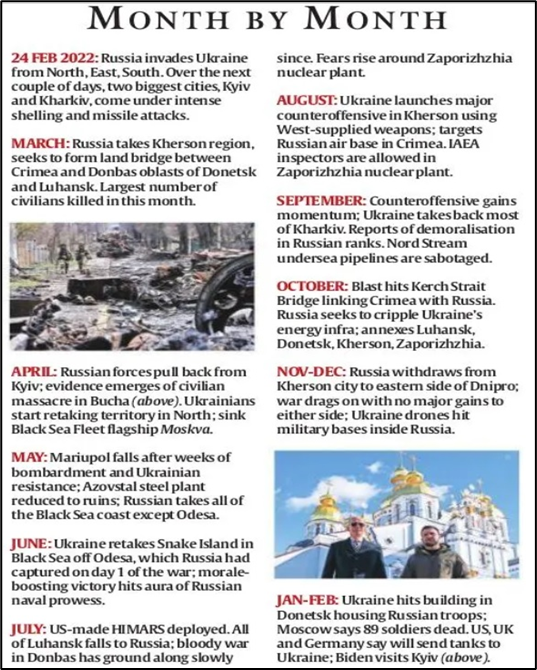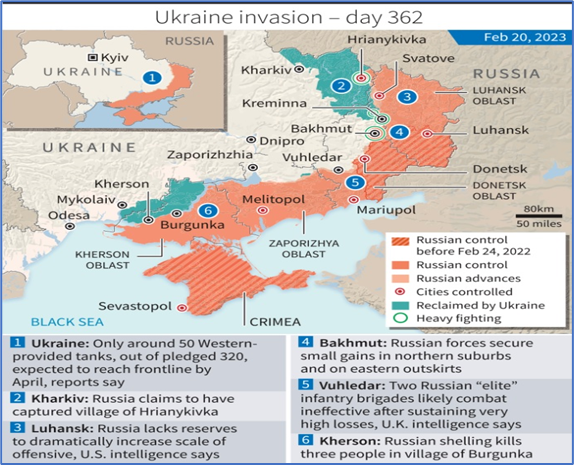Why in news?
- Russia’s war against Ukraine is exactly a year old today. Calculations on both sides that this would be a short, swift war have proved wrong.

What’s in today’s article?
- Russia-Ukraine War
- News Summary
What is the Background of Russia-Ukraine conflict?
- Tensions between Ukraine and Russia escalated in late 2013 over a landmark political and trade deal with the European Union.
- After the pro-Russian then-President, Viktor Yanukovych, suspended the talks weeks of protests in Kyiv erupted into violence. Soon, the then pro-Russian President was ousted.
- Russia responded by invading Crimea, which was a part of Ukraine, and annexing it in March 2014.
- Russia invaded Crimea on the pretext that it was defending its interests and those of Russian-speaking citizens.
- Shortly afterwards, pro-Russian separatists in Ukraine's Donetsk and Luhansk regions declared their independence from Kyiv (capital of Ukraine).
- They established their own autonomous state called Donetsk People's Republic in 2014.
- Kyiv and Moscow signed a peace deal in Minsk in 2015. It was brokered by France and Germany. But it could not bring peace in the region.
- Russia, in February 2022, recognised the independence of these two regions (Donetsk and Luhansk).
- Later, in February 2022, Russian President Vladimir Putin declared war on Ukraine in a televised address.
- He said the military action announced by Russia will seek to demilitarize Ukraine and came in response to threats from Ukraine.
Why Russia invaded Ukraine?
- Russia wanted a guarantee Ukraine can never join NATO
- Russia's main demand was a commitment from NATO to end its further expansion into former Soviet republics — especially Ukraine.
- Russia wants NATO arms out of Eastern Europe
- Russia wants NATO to stop deploying its weapons and forces in countries in Central and Eastern Europe that joined the alliance after 1997.
- Russia wants a ban on NATO missiles within striking distance
- Russia has nervously watched as NATO has demonstrated it can deepen its involvement in Ukraine — providing weapons and training.
- NATO missiles on Ukrainian soil might pose serious threat to Russia’s security.
- Russia wants autonomy for eastern Ukraine
- Russia says Ukraine must meet its obligations under 2015 agreements.
- The peace deal, known as the Minsk agreements, was signed to end the fighting between Ukraine's army and pro-Russian separatists in eastern Ukraine.
- The Minsk agreements also provided additional autonomy to the separatist Russian-speaking territories in the Donbas.
News Summary: One year of war in Ukraine
- A year after Russia launched its invasion of Ukraine, there are signs of escalation everywhere.
- The West has recently announced the supply of more advanced weapons to Ukraine, deepening its involvement in the conflict.
- In response, Russian President announced the suspension of his country’s participation in the New Start treaty, which could trigger a nuclear arms race.
What’s the current status of the war?

- Russia is expected to launch a new offensive in the coming days. Right now, focused fighting has been going on in some flashpoints along the frontline.
How has Russia’s invasion of Ukraine reshaped the geopolitics of the world?
- European countries started to focus on its security and defence
- In this respect, the German turnaround from its post-World War pacifism was the most significant.
- Re-energised the Europe-US security alliance
- NATO has opened its door to the proposed inclusion of Sweden and Finland.
- For this inclusion, Turkey’s approval is awaited. If this inclusion takes place, it will form the new military frontiers of the alliance against Russia.
- Europe at the centre of new arms race between Russia and the US
- Recently, Russia suspended its participation in the New START Treaty, negotiated with the US in 2011 to cap their nuclear weapons.
- The trust deficit between Russia and the West is at an-all time high. The US-led alliance is pouring weapons into Ukraine.
- Russia- China axis
- Recently, former Chinese foreign minister Wang Yi met President Putin in Moscow in an affirmation of the friendship formalised last year as “limitless”.
- However, keeping its economic interests in mind, Beijing does not wish to jeopardise its Europe ties.
- Hence, over the last year, China has remained at arm’s distance from Russia’s war – no Chinese weapons for Moscow, and even a warning by President Xi Jinping against nuclear weapons.
- Growing interest in the Indo-Pacific and the Quad
- Earlier, the security experts had predicted that the Russia-Ukraine war would distract US interest from the Indo-Pacific, which proved to be wrong.
- Now, even European countries are showing more interest in the Indo-Pacific and the Quad than before, and want in.
- Concerns of developing nations
- The war has disrupted the supply chain and the prices of energy, fertilisers and other essential commodities have increased.
- As a result, various developing countries have started to feel the heat of this war.











